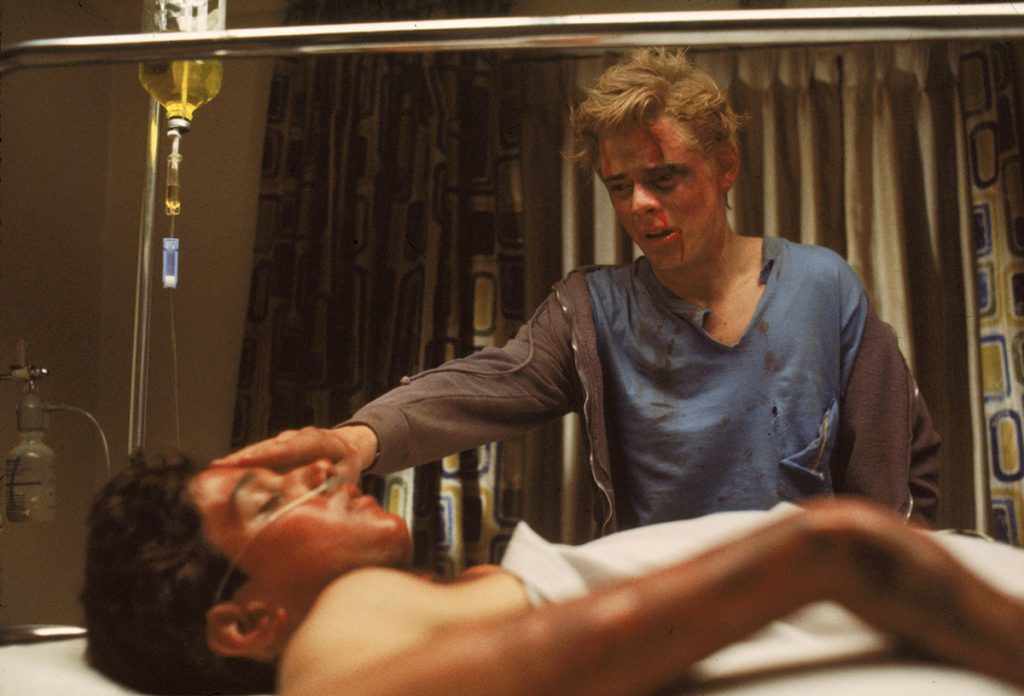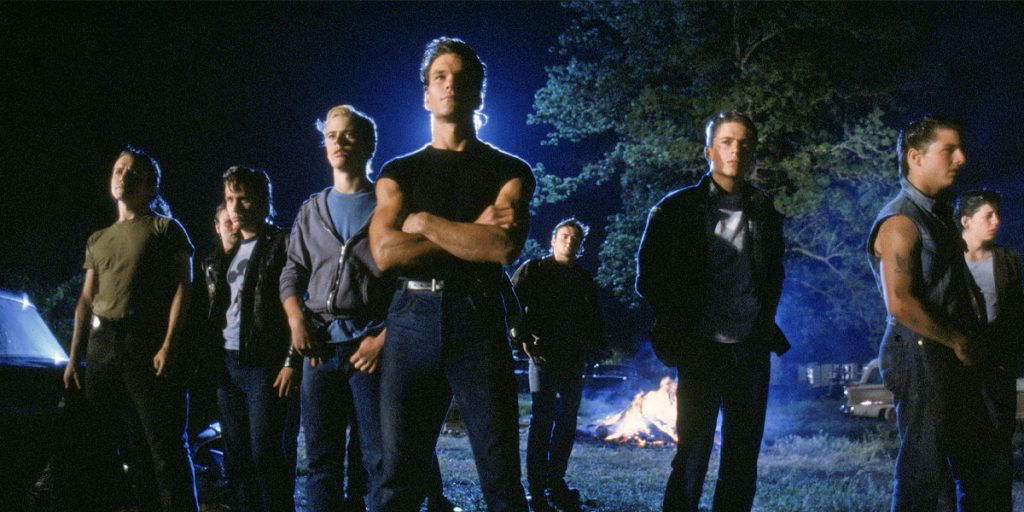Uniquely and stunningly overdramatic, The Outsiders is turned by Francis Ford Coppola and his cast, against all odds, into an incredibly engrossing picture.
When The Outsiders opens, it is the early 1960s (or so we can assume from advertisements for The Hustler plastered across cinema marquees) in an unnamed southern US city, and the teen gangs of the Greasers and the Socs are at war. Greaser Ponyboy Curtis (a 15-year-old C. Thomas Howell), threatened at knifepoint by a group of Socs on his walk home, finds himself at the centre of increasingly violent disputes, reaching a head when a Soc is murdered in self-defence by shy Greaser Johnny Cade (The Karate Kid’s Ralph Macchio in his debut film appearance). Ponyboy and Johnny must escape to the nearby countryside and lie low until it is safe enough to return, while back in the city, the war between the gangs has grown ever more deadly.
This may sound a little clichéd, and with good reason – S.E. Hinton’s original novel is often claimed as the originator of young adult fiction, and thus can be seen to contain all the genre’s myriad advantages and flaws: it revels in the pure, visceral melodrama of teenage conflict, while not necessarily exploring themes and motifs with a particularly light touch. How do Johnny and Ponyboy prove that even gangsters are good guys after all? Why, they save a group of children from a burning building, of course. How do they demonstrate an emotional depth you don’t expect from kids in double denim? They watch sunsets and quote Robert Frost and Gone with the Wind at each other. If there is a word to describe The Outsiders’ storyline, it is unashamedly ‘teenage’, with all the self-determined severity that comes with it.
With this story as its source material, and with director Francis Ford Coppola charting a tight course to its plot, it would be easy for The Outsiders to have fallen apart in a self-indulgent mess. It is a wonderful surprise, then, that Coppola is more than able to exert his influence in a movie that quickly becomes an immersive, engrossing experience, an experience only heightened in its new 4K restoration. By focusing less on the violence present in the story, instead reducing it to a steady background hum with occasional, surprising eruptions, Coppola treats the work as an exercise in escapism, with a wild tonal inconsistency that only works as a product of the film’s internal environment. The abundant music cues, while often heavy-handedly 60s focused with Dick Dale-esque guitar licks at every turn, help build the steady foundation of environment upon which the story can unfold itself. The result is more American Graffiti than anything else, with its melodrama woven into its details rather than sitting uncomfortably alongside them.

It is a credit to the acting, too, that the drama imparts an emotional heft far closer to the resonance of the novel than may be expected. Howell is excellent as Ponyboy, the grounded emotional heart of the picture, and shows a sensitivity in his wannabe-tough-guy persona unbecoming of a 15-year-old actor. Macchio, likewise, is phenomenal: as characters veer from emotional extreme to extreme, Macchio’s willingness to demonstrate elation and despair as two sides of the same coin imparts a sincere tenderness. Matt Dillon also excels as Dallas, the fresh-out-of-jail bad influence on the younger members of the group. Dillon brings the required sense of assumed maturity, an aspirational charm to a character that becomes increasingly erratic and terrifying to an audience more removed from the idolatry that consumes Ponyboy and Johnny.
It shouldn’t necessarily come as a surprise that a Coppola film is so well-cast, considering the reputation the director has for top-to-bottom all-star rosters. What is so surprising is the sheer number of brat pack stars for whom The Outsiders was star-making – Rob Lowe, Patrick Swayze, Tom Cruise, Emilio Estevez to name a non-exhaustive number – in fact, this film is often described as one of the cornerstones of the group’s identity. There is a mind-boggling amount of talent devoted to this picture both in front of and behind camera, a testament to the director’s reputation and the enduring legacy of S.E. Hinton’s novel, and discovering the stars hidden throughout the picture is a joyous undertaking: Tom Waits’ one-line cameo at a house party, or Nicolas Cage and Flea as uncredited extras in a major fight scene.
For a movie that, at the time, only received lukewarm critical response, to now receive a 4K restoration almost four decades on speaks highly of the legacy that the movie imparts beyond its runtime. It is worth analysing The Outsiders simply on the grounds of how it inexorably bound together and gave an identity to one of the most distinctive groups of collaborators in 1980s cinema, becoming an artifact of undeniable weight in Coppola’s own magnificently influential repertoire. Although The Outsiders may tell a story that many others have told, often with a little more deftness of touch than we see here, it does so with a panache and confidence that, against all odds, marks a film of undeniable legacy on the landscape of the cinematic decade (and beyond) to come.
A 4K restoration release of The Outsiders: The Complete Novel was released in cinemas in the U.K. on 15 October, and on Blu-Ray, DVD and Digital Platforms from 8 November, 2021.

